Kayak - Close To The Fire (2000)
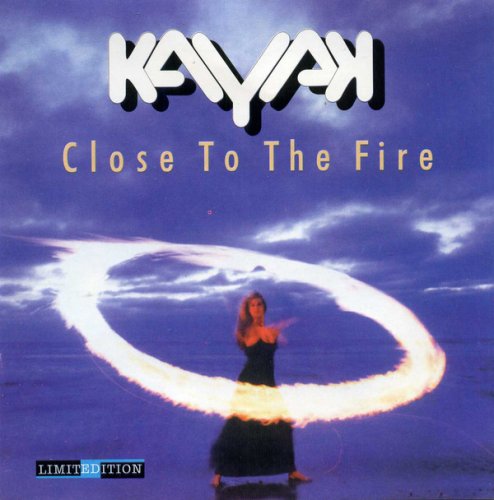
Artist: Kayak
Title: Close To The Fire
Year Of Release: 2000
Label: Stress Records
Genre: Symphonic Rock, Prog Rock
Quality: Mp3 320 / Flac (image, .cue, log)
Total Time: 01:03:08
Total Size: 156/436 Mb (scans)
WebSite: Album Preview
Title: Close To The Fire
Year Of Release: 2000
Label: Stress Records
Genre: Symphonic Rock, Prog Rock
Quality: Mp3 320 / Flac (image, .cue, log)
Total Time: 01:03:08
Total Size: 156/436 Mb (scans)
WebSite: Album Preview
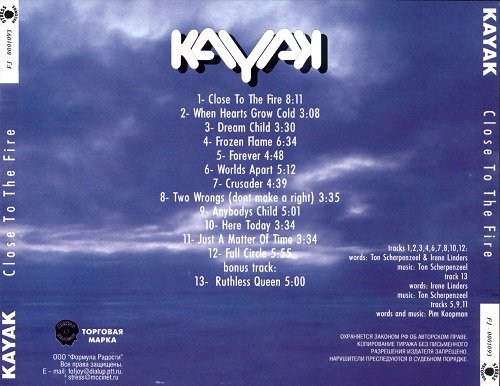
Tracklist:
1. Close to the fire (8:11)
2. When hearts grow old (3:08)
3. Dream child (3:30)
4. Frozen flame (6:34)
5. Forever (4:48)
6. World aparts (5:12)
7. Crusader (4:39)
8. Two wrongs (don't make a right) (3:35)
9. Anybody's child (5:01)
10. Here today (3:34)
11. Just a matter of time (3:34)
12. Full circle (5:55)
13. Ruthless queen (5:00)
Line-up::
Pim Hoopman - drums, percussion, backing vocals
Ton Scherpenzeel - keyboards, backing vocals
Bert Veldkamp - bass, backing vocals
Max Werneer - lead vocals, percussion
Rob Winter - guitars, backing vocals
With their instrumental prowess and keyboardist Ton Scherpenzeel's facility at writing lyrics in English, you might be forgiven for mistaking Kayak for a bunch of clever proggers from London. But this Dutch band began in 1968 in the city of Hilversum, where Scherpenzeel and drummer Pim Koopman attended a music conservatory. After the addition of guitarist Johan Slager, bassist Cees van Leeuwen, and vocalist Max Werner, the group solidified by 1972 and commenced recording. Stylistically they featured the instrumentation and chops of progressive acts like Yes and Genesis, but the pop song structures of Supertramp and the Alan Parsons Project; as time passed they increasingly favored the pop side of the equation. Royal Bed Bouncer, the most even balance between these two styles, was to be a commercial and artistic high point for the band. They continued to meet with minor success throughout the '70s on a variety of record labels, and in 1974 toured in support of Queen -- a move that influenced the flavor of their later work.
Like most progressive bands, Kayak never had a terribly stable lineup; at one point they went through three bassists in as many years. With Scherpenzeel as the sole constant, Kayak's first lineup also proved to be their finest; but Koopman's asthma forced him to retire in 1976, and Werner was so tortured by stage fright and unfounded doubts over his singing ability that he demanded the vacated drum chair for himself, leaving the vocal duties to new member Edward Reekers. Scherpenzeel's central role in the band eventually wore on the others, and Kayak fell apart in 1980. Scherpenzeel continued on to work with the English band Camel and then compose primarily for the theater. Koopman and Reekers worked in music production and performance; Werner left the stage to become a postal worker; and van Leeuwen became -- of all things -- a prominent lawyer. The band reunited in 1997 for a Dutch TV special, though no new recordings have yet emerged.
Like most progressive bands, Kayak never had a terribly stable lineup; at one point they went through three bassists in as many years. With Scherpenzeel as the sole constant, Kayak's first lineup also proved to be their finest; but Koopman's asthma forced him to retire in 1976, and Werner was so tortured by stage fright and unfounded doubts over his singing ability that he demanded the vacated drum chair for himself, leaving the vocal duties to new member Edward Reekers. Scherpenzeel's central role in the band eventually wore on the others, and Kayak fell apart in 1980. Scherpenzeel continued on to work with the English band Camel and then compose primarily for the theater. Koopman and Reekers worked in music production and performance; Werner left the stage to become a postal worker; and van Leeuwen became -- of all things -- a prominent lawyer. The band reunited in 1997 for a Dutch TV special, though no new recordings have yet emerged.

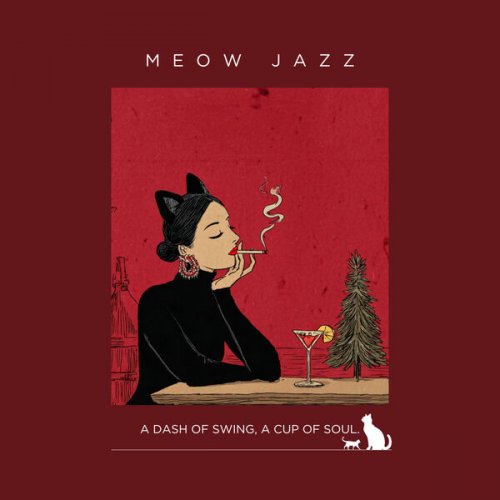
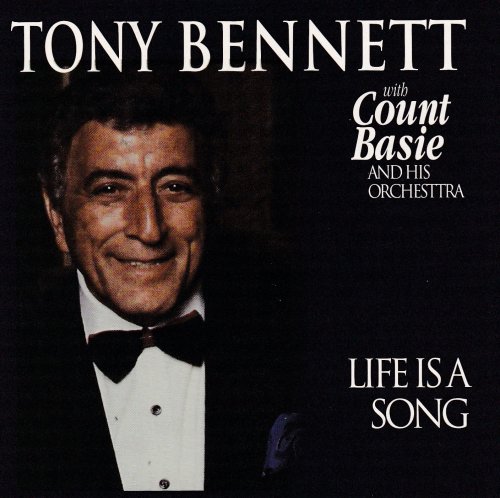
![Karin Krog, John Surman, Rob Luft & Rob Waring - Tomorrow's Yesterday (2026) [Hi-Res] Karin Krog, John Surman, Rob Luft & Rob Waring - Tomorrow's Yesterday (2026) [Hi-Res]](https://www.dibpic.com/uploads/posts/2026-02/1770018384_aet0hkqmwovku_600.jpg)
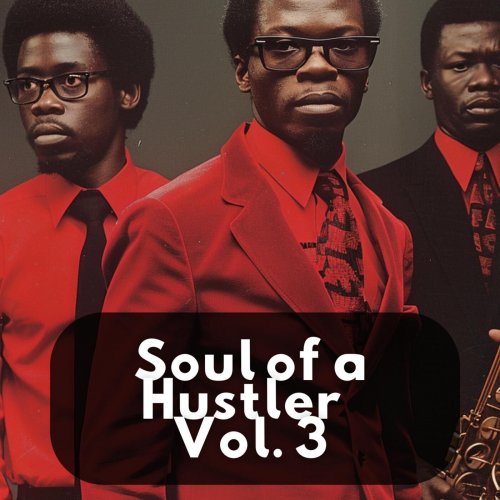
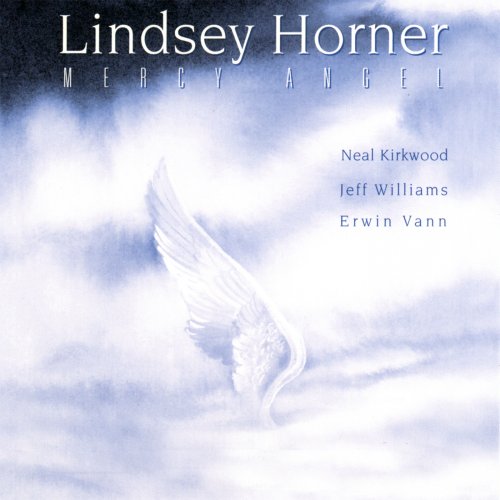
![Rahsaan Roland Kirk - Now Please Don't You Cry, Beautiful Edith (2025 Remaster) (2026) [Hi-Res] Rahsaan Roland Kirk - Now Please Don't You Cry, Beautiful Edith (2025 Remaster) (2026) [Hi-Res]](https://www.dibpic.com/uploads/posts/2026-01/1769782162_cover.jpg)
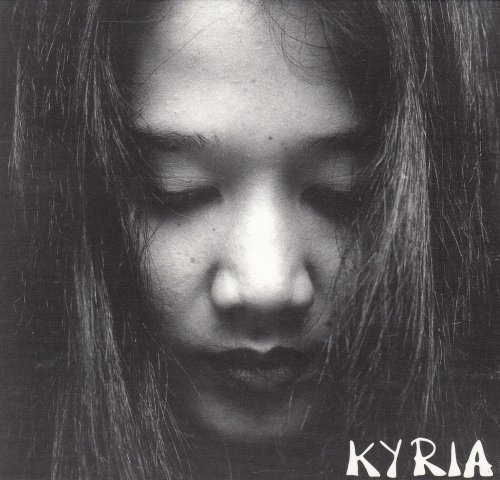
![Dave Douglas - Four Freedoms (2026) [Hi-Res] Dave Douglas - Four Freedoms (2026) [Hi-Res]](https://www.dibpic.com/uploads/posts/2026-01/1769535616_tf9hcodjkxidc_600.jpg)